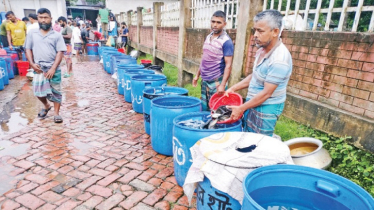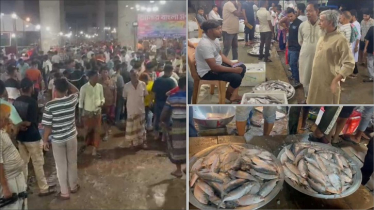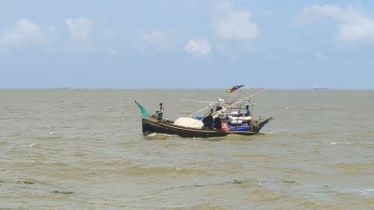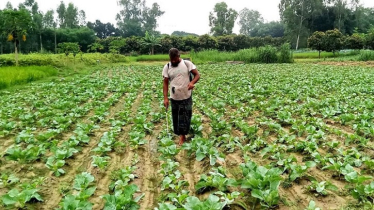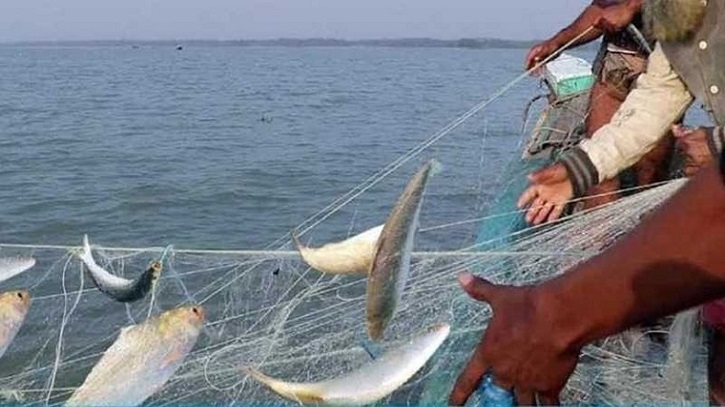
Gaurabdi Union of Hijla upazila in Barishal, a Meghna River island settlement long hailed as a “treasure trove of hilsa,” is now facing an alarming depletion of stocks. Decades of reckless overfishing and political control over the fisheries have turned the once-thriving breeding ground into an almost barren stretch.
For over fifteen years under the Awami League government, Union Chairman and local party vice president Nazrul Islam Milon exerted near-total dominance over the Meghna’s hilsa trade in Hijla. Despite regulations from the Department of Fisheries restricting harvest during breeding seasons, fishing continued under his personal authority. Milon built significant wealth through the hilsa business, with the law repeatedly sidelined by his political influence.
Since the change of government last year, control of the fisheries has shifted to opposition leaders. Former chairman and BNP convener of Hijla upazila, Gaffar Talukder, along with several associates, now wields similar power over the same fishing zones. Like their predecessors, they divide river stretches and fish landing stations, known locally as ghats, among themselves.
The system of riverbank fish landing stations began under the four-party coalition government in 2001. These ghats, numbering in the hundreds between Chandpur’s Shatnol and Barishal’s Hijla and Mehendiganj, operate without government authorization. Whoever holds political sway controls the ghats and, by extension, the fishermen. Influential operators finance fishermen with advances running into lakhs of taka. In return, they claim a 10 percent commission from fish sales. During breeding bans, it is these ghat controllers who shield fishermen in indiscriminate jatka (juvenile hilsa) fishing.
Sources indicate that after the Awami League lost power in August last year, the BNP divided up the Meghna ghats among its leaders. Talukder controls the northeast portion of the river near Hijla-Gaurabdi, while BNP joint convener Khokon Doptori and others control the southern stretches. In Memania Union, the river is divided three ways between Talukder, labor wing leader Shahin Khan, and district student leader Sujon Sardar. In Harinathpur, former union BNP president Khalek Majhi controls one section, while others share control, including political figures from neighboring Shariatpur. Similar divisions are reported in Dhulkhola and Mehendiganj areas, with multiple BNP leaders managing lucrative ghats.
The same pattern is evident further downstream in Bhola’s Charfashion and Char Kukri, where union-level BNP leaders control key landing stations. Even parts of Patuakhali’s Bauphal are reported to be under the grip of local BNP activists. Leaders often deny involvement in jatka exploitation but acknowledge controlling multiple ghats. Some, like labor wing president Shahin Khan, admit that reckless overfishing has decimated hilsa but deny personal involvement.
Meanwhile, Department of Fisheries officials continue to struggle to enforce bans. Under national law, all fishing is prohibited for 22 days in October during peak spawning season, alongside a two-month ban in March and April, and an eight-month jatka ban from November to June. However, fishermen, under the protection of political patrons, frequently flout these rules. Fisheries officials have faced violent resistance during enforcement drives. In one instance, during the March–April ban, Hilsa Resource Development Project Director Molla Emdadullah came under attack three times while conducting raids.
Statistics confirm the steep decline in juvenile hilsa catches. In 2021–2022, 146 tons of jatka were confiscated; in 2022–2023, 108 tons; in 2023–2024, 71 tons; and in 2024–2025, just 37 tons. Officials admit these figures underrepresent the reality, as vast quantities continue to be sold openly in wholesale markets. During ban periods, jatka as small as two to three inches are marketed as chapila and sold for Tk 200 per kilogram, with up to 40 fish per kilogram.
Molla Emdadullah emphasized that the main hilsa breeding grounds stretch from Chandpur’s Shatnol through Hijla-Mehendiganj in Barishal, with significant habitats also in Lakshmipur and Shariatpur. “If the Meghna’s hilsa is not protected, there will be no hilsa left anywhere,” he warned. He added that from tomorrow, a 22-day nationwide fishing ban will begin, with speedboats deployed at key points to ensure compliance. However, he noted that tackling political patronage of illegal fishing is a matter for local administrations.
The crisis underscores how one of Bangladesh’s most iconic natural resources is being devastated by political turf wars and unchecked exploitation, threatening both livelihoods and the future of the country’s national fish.


